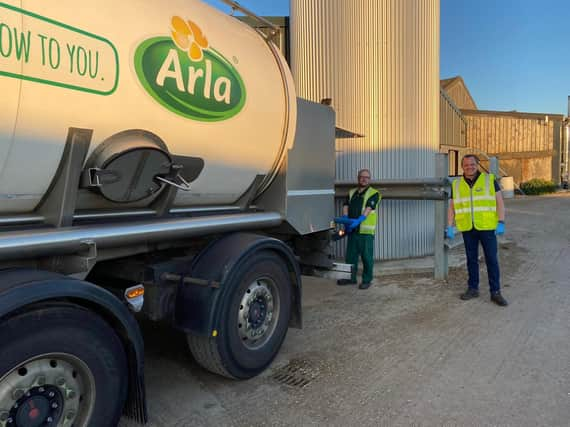Yorkshire farmers at Leeds based dairy co-operative Arla are trained to fill milk tankers and stay on-stand by through the pandemic


With the realisation that if 13 per cent of the milk tanker collection drivers had to stop work during the pandemic the company would struggle to fulfil its obligations, a contingency plan was put in place.
Arla’s agricultural director, Graham Wilkinson, who lives in Northallerton, said: “Arla’s cooperative ethos meant from the start of the pandemic, its farmer owners were asking what they could do to help the business.”
Advertisement
Hide AdAdvertisement
Hide AdArla Foods has a cooperative obligation to collect all the milk from its 2,400 UK farmer owners and the company described the skillset held by in-bound drivers as “incredibly specific”.
As well as collecting the milk from farms, Arla said the drivers are responsible for monitoring and testing both temperature and quality to ensure food safety during transportation.
So to avoid a situation where there might be a drop in drivers, Arla trained 19 of its dairy farmers and ten members of its agriculture team to provide a back-up option for its logistics team if needed.
“When we asked the elected farmers to help us with this challenge there was no shortage of volunteers.”
Advertisement
Hide AdAdvertisement
Hide AdMr Wilkinson said the training was well received by staff, ran smoothly, and also highlighted that cross-business education will be a positive move for Arla in the longer term.
The move did mean, however, that as well as implementing the standard coronavirus measures on farms, farmers had to undergo video training and practical training with the tanker putting social distancing measures into practice.
This meant that if there were a shortage of tanker drivers, Arla would then be able to use drivers from outside the industry with the newly trained farmers available to follow the tanker by car and manage milk collection and quality checking aspects at farms in their area.
Arla farmer, Carrie Burridge, who underwent the training said it had been a really good experience.
Advertisement
Hide AdAdvertisement
Hide Ad“The training was great. It really makes you stop and think about just how important the quality of our milk is.
“Using the technology to test samples and learning how many safety precautions are in place really surprised me, but it’s definitely made me value our tanker drivers even more.
“I was very impressed that Arla managed to pull off the training and put in place so many measures to keep us all safe in the process.”
To support the elected farmers, ten of Arla’s agriculture team, located across the country also undertook the training, including Mr Wilkinson.
Advertisement
Hide AdAdvertisement
Hide AdSpeaking about his involvement, he said: “If we’re asking our farmers to provide extra support to the business, I also wanted them to feel supported by us too.
“As the saying goes, you should never ask your team to do anything you wouldn’t be prepared to do yourself.”
The training covered the collection process, the health and safety procedures, collecting, labelling and testing samples, insurance requirements, and the necessary hygiene steps needed to ensure their fellow farmers’ milk was protected.
With the training completed the team is on stand-by if they are needed and even with lockdown restrictions being eased, their skills are already in place.
Advertisement
Hide AdAdvertisement
Hide AdThe co-operative said that whilst the immediate risk has subsided, with the possibility of a second peak and the duration of coronavirus unknown, the farmers and Arla’s agriculture team will remain on hand to support Arla’s logistics team if needed.
The company said this initiative was just one of many across Arla Foods to keep the industry running.
Staff have taken on additional training to provide back-up support at production sites where business functions have been most impacted by recent events.
In total, over 21,000 hours of coronavirus related training has been carried out by Arla in the last two months.
Advertisement
Hide AdAdvertisement
Hide AdMr Wilkinson said the willingness to adapt to change and support each other was part of being a co-operative.
“Being a cooperative is not just a business model.
“It shapes the way you think, your attitude to those you work with and the decisions you take.
“Never has our cooperative ethos been so evident in action as it has in these past few months.
“We are very grateful to all those farmers and colleagues who have stepped up to help support the business and keep the milk moving.”
Comment Guidelines
National World encourages reader discussion on our stories. User feedback, insights and back-and-forth exchanges add a rich layer of context to reporting. Please review our Community Guidelines before commenting.